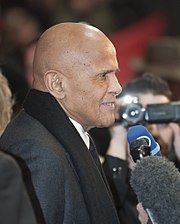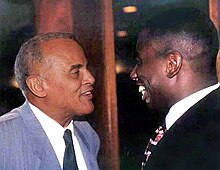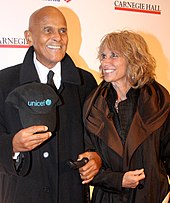Harry Belafonte
Harry Belafonte (/ˌbɛləˈfɒnti/ BEL-ə-FON-tee; born Harold George Bellanfanti Jr.; March 1, 1927 – April 25, 2023) was an American singer, actor, and civil rights activist who popularized calypso music with international audiences in the 1950s and 1960s.
[1] Belafonte was best known for his recordings of "Day-O (The Banana Boat Song)", "Jump in the Line (Shake, Senora)", "Jamaica Farewell", and "Mary's Boy Child".
[16] At the end of the 1940s, Belafonte took classes in acting at the Dramatic Workshop of The New School in New York City with the influential German director Erwin Piscator alongside Marlon Brando, Tony Curtis, Walter Matthau, Bea Arthur, and Poitier, while performing with the American Negro Theater.
[23] Between 1953 and 1954, he was a cast member of the Broadway musical revue and sketch comedy show John Murray Anderson's Almanac where he sang Mark Twain,[25] of which he was also the songwriter.
[citation needed] Following his success in the film Carmen Jones (1954), Belafonte had his breakthrough album with Calypso (1956), which became the first LP in the world to sell more than one million copies in a year.
Belafonte received Grammy Awards for the albums Swing Dat Hammer (1960) and An Evening with Belafonte/Makeba (1965), the latter of which dealt with the political plight of black South Africans under apartheid.
[45] However, the episode is best known for Belafonte's rendition of the spiritual song "Turn the World Around", from the album of the same name, which he performed with specially made Muppets that resembled African tribal masks.
With fundraiser Ken Kragen, he enlisted Lionel Richie, Kenny Rogers, Stevie Wonder, Quincy Jones and Michael Jackson, The song they produced and recorded, "We Are the World", brought together some of the era's best-known American musicians and is the eighth-best-selling single of all time with physical sales in excess of 20 million copies.
[51] In the same year Belafonte, as UNICEF Goodwill Ambassador, attended a symposium in Harare, Zimbabwe, to focus attention on child survival and development in Southern African countries.
Belafonte went on the Today Show to promote the album on September 11, 2001, and was interviewed by Katie Couric just minutes before the first plane hit the World Trade Center.
[70] In 2006, Belafonte appeared in Bobby, Emilio Estevez's ensemble drama about the assassination of Robert F. Kennedy; he played Nelson, a friend of an employee of the Ambassador Hotel (Anthony Hopkins).
[77] After King had been arrested for his involvement in the Montgomery bus boycott in 1955, he began traveling to Northern cities to spread awareness and acquire donations for those struggling with social segregation and oppression in the South.
He contributed to the 1961 Freedom Rides, and supported voter registration drives[79][82] He later recalled, "Paul Robeson had been my first great formative influence; you might say he gave me my backbone.
In the middle of a duet of On the Path of Glory, Clark smiled and briefly touched Belafonte's arm,[85] which prompted complaints from Doyle Lott, the advertising manager of the show's sponsor, Plymouth Motors.
Belafonte taped an appearance on an episode of The Smothers Brothers Comedy Hour to be aired on September 29, 1968, performing a controversial Mardi Gras number intercut with footage from the 1968 Democratic National Convention riots.
Unexpectedly, Belafonte was not so impressed by the candidate, sharing the same sentiments as Robinson about Kennedy's role (or lack thereof) in maintaining civil rights as an essential part of his campaign.
To improve his engagement with Black America, Belafonte suggested to Kennedy that he contact Martin Luther King, making a connection to a viable source of leadership within the movement.
The purpose of the call was to invite Belafonte to a meeting to speak with Attorney General Robert Kennedy about the continued plight of the Black people in America.
[92] The other members included were Thais Aubrey, David Baldwin, Edwin Berry, Kenneth Clark, Eddie Fales, Lorraine Hansberry, Lena Horne, Clarence Jones, Burke Marshall, Henry Morgenthau III, June Shagaloff, Jerome Smith, and Rip Torn.
"[98] On February 1, 2013, Belafonte received the NAACP's Spingarn Medal, and in the televised ceremony, he counted Constance L. Rice among those previous recipients of the award whom he regarded highly for speaking up "to remedy the ills of the nation.
In 1987, he was the master of ceremonies at a reception honoring African National Congress President Oliver Tambo at Roosevelt House, Hunter College, in New York City.
[117] Belafonte achieved widespread attention for his political views in 2002 when he began making a series of comments about President George W. Bush, his administration and the Iraq War.
[121] In January 2006, Belafonte led a delegation of activists including actor Danny Glover and activist/professor Cornel West to meet with Venezuelan president Hugo Chávez.
In 2005, Chávez, an outspoken Bush critic, initiated a program to provide cheaper heating oil for poor people in several areas of the United States.
"[128] In another interview, Belafonte remarked that while his comments may have been "hasty", he felt that the Bush administration suffered from "arrogance wedded to ignorance" and its policies around the world were "morally bankrupt.
"[129] In a January 2006 speech to the annual meeting of the Arts Presenters Members Conference, Belafonte referred to "the new Gestapo of Homeland Security", saying: "You can be arrested and have no right to counsel!
[citation needed] Belafonte died from congestive heart failure at his home on the Upper West Side of Manhattan, New York City, on April 25, 2023, at the age of 96.
[189] He also received various honours including the Kennedy Center Honors in 1989, the National Medal of Arts in 1994 and was inducted into the Rock and Roll Hall of Fame in the Early Influence category in 2022.
[6] Belafonte celebrated his 93rd birthday on March 1, 2020, at Harlem's Apollo Theater in a tribute event that concluded "with a thunderous audience singalong" with rapper Doug E. Fresh to 1956's "Banana Boat Song".
Soon after, the New York Public Library's Schomburg Center for Research in Black Culture announced it had acquired Belafonte's vast personal archive of "photographs, recordings, films, letters, artwork, clipping albums," and other content.















